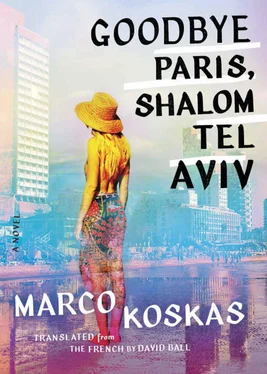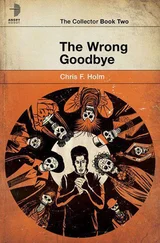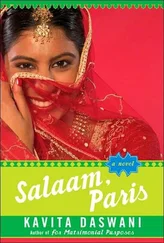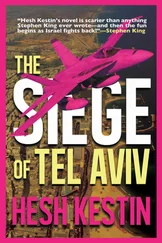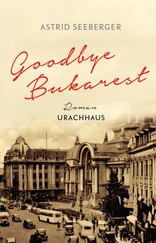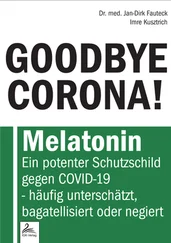Marco Koskas
GOODBYE PARIS, SHALOM TEL AVIV
The new Jerusalem streetcar line is modern, fast, and frequent. One every four minutes and at rush hour, every two minutes on average. It took years of work and caused huge traffic jams that exasperated the shopkeepers and neighbors of Yafo Street, but today all those annoyances are no more than a bad memory. It’s been up and running since September 2011. Finally. And it’s changed the landscape. People have even forgotten how Jerusalem was before the tram. Or without a tram.
Only, nobody’s very relaxed on the cars. It’s too bad—all that hatred between Jews and Arabs, that distrust and paranoia. Yet terrorist attacks are extremely rare on the line. Two or three cars rammed at the Beit Hanina and Shuafat stops on the northern section, but never stabbings inside like every day in town and in the Occupied Territories for the last few years. No one knows why, exactly. Maybe down deep, the Jews and Arabs of Jerusalem think of the streetcar as their common possession and it’s better to preserve it. Intifadas come and go, the streetcar remains…
Juliette takes it Saturday night after Shabbat as she comes back from Pisgat Ze’ev, and she fearlessly takes a window seat because even if an Arab throws a rock as the trolley goes by, it won’t break the window. They say it was designed for that. The tram’s windowpanes were megareinforced.
It will take her twenty-five minutes to get to the bus station, where she’s going to get the 490 bus to Tel Aviv. For tonight, Juliette is saying her final farewells to Jerusalem. Her farewells to the museum came at the end of the day before yesterday. Five years of managing the reserves under the supervision of Aviva Morgenstern, you really had to hold up! Above all, not break down… still, at her going-away party, she did pay tribute to her boss’s great professionalism, her human qualities, her culture, and that old nut Aviva couldn’t hold back her tears.
Juliette will return to Jerusalem, of course. It’s the city she has in her heart, the city of her childhood and her first loves—her mother’s city, her sister Mathilde’s, her brother Assaf’s, and her girlfriends’ city too. Sure, she’ll come back, but no more than every third Shabbat because even if Shabbat at Mathilde’s in Pisgat Ze’ev is nice, it’s very restrictive. No smoking, no phoning, what a pain! Luckily, Juliette adores her nephews. Seven kids in twelve years, you have to admire her. She had the first at twenty-two and the last one six months ago, at the age of thirty-four; the next one will be when God wills. With the Orthodox, women have six kids on average. So there’s nothing unusual about it, except that Juliette’s already twenty-nine and she’s nowhere near having a kid. Not the ghost of the chance of a first one on the horizon. What a difference between the two of them! It’s funny, two sisters so unlike each other. To be precise: two half sisters.
Juliette did promise herself to have at least one child before she turned thirty, but since she’s been with Elias, the odds are she won’t keep that promise. The fact that he suggested she live with him in Tel Aviv is already unbelievable. Unhoped for. Practically a godsend! Makes her believe he loves her like when you really love someone. She met him in Jerusalem the year before, and at the beginning he didn’t even want people to see them together. She was living in a studio apartment in Nahalat Shiva and he was in Gilo, in a new development. When he slept at her place, he ran off before the sun came up. A wild one, Elias. But there you are, Juliette loves his wildness. When he first came to Jerusalem, he slept in parks, out in the open, so in love with Israel that he’d live there like a beggar without complaining, and hungry most of the time to boot.
When he left Jerusalem, Juliette thought he was only going to live in Tel Aviv to get away from her. But no. Finally, he cares more about her than she thought. Despite his degree in petrochemical engineering and his acceptance by FEMIS, the prestigious French film school, Elias wants to be a journalist while waiting to write his first novel. He changes vocations regularly. At thirty-four, he’s still trying to find himself and that worries his family. But what about Henry Miller? At what age did he become a novelist? Elias worships Henry Miller, that’s obvious. He’s reread The Rosy Crucifixion three times, and he always has one of the three parts of the trilogy on him: Sexus , Plexus , or Nexus is forever peeping out of his pocket. On the other hand, he reads and rereads Céline on the sly, because hey, reading that anti-Semitic sonofabitch in the country of the Jews is really pushing it. His pal Manu gave him the Voyage illustrated by Tardi, and Elias leafs through it practically every night, both enchanted and mortified by Céline’s genius. Some Jews’ taste for Céline is hard to explain, but at least Manu has a theory about his anti-Semitism. He always quotes the passage in Death on the Installment Plan where Céline talks about his father, a clerk in an insurance company, who was fired after the invention of typewriters. And Céline imitates him, accusing the Jews of having invented those diabolical machines.
That’s where Manu’s theory comes from: Céline’s anti-Semitism is simply an inability to be different from the father. Whew! Elias loves that theory. He loves Manu. Between those two, the three topics of conversation are, in order of importance, Céline, women, and Céline.
Manu, too, made his aliyah three years ago, who knows why. He was doing great as an actor in hard-core adult movies in Paris, but he got sick of it. Understandable, after thirty years of porn. A four-month stay in Jerusalem, but the city’s a little too spiritual for a guy with a CV like his, a bit too drenched in the sacred. Even when he’s parking a car, Manu carries around with him his old, dirty past and definitely prefers Tel Aviv. At least there he can talk about his career without shocking anybody.
Anyway, Juliette’s making the big leap this evening. She doesn’t know Tel Aviv very well aside from Metzitzim Beach and a few hip bars in Neve Tzedek. She doesn’t know many people there, either, aside from Elias and his buddies. They’re all thirtysomethings except for Manu and Diabolo. And hopelessly French. Likeable, but megamacho. Actually, Juliette’s French too. But she’s always lived in Jerusalem, that’s the difference, aside from her four years at the École du Louvre in Paris. Wonderful memories. All those museums, that vibrant Parisian life. Living among those nymphs and sylphs suited her. She resembles them so much! As angelic as a Botticelli but with the freshness of Sandrine Bonnaire in À Nos Amours . And that very ephemeral grace girls between sixteen and eighteen sometimes have.
A real pietà, that Juliette, but with curves like Bar Refaeli.
She calls Elias to tell him she’ll be at his place in less than two hours, and she secretly hopes he’ll offer to pick her up with his scooter at Tachana Merkazit because Tel Aviv’s central bus station is in a rough part of town: Sudanistan, as the papers say. But Elias seems to have his head somewhere else. He repeats, “OK, doll. OK, great, I’ll wait for you,” with his exasperating way of openly thinking of something else when she talks to him, without even trying to hide it. Finally, Juliette hangs up, disappointed, even slightly bitter, and she doesn’t notice the feverish Arab slipping in between the standing passengers. Just at the moment he’s about to throw himself at her and stick a knife in her chest, there’s the sound of an explosion and the guy’s carotid explodes in a thousand pieces of red flesh that spatter on the ceiling of the car at the same time his eyes pop out of their sockets. He drops his knife and collapses on Juliette, drenching her with his blood. It all happens at once. Life, death, screams—ordinary life in Jerusalem.
Читать дальше
